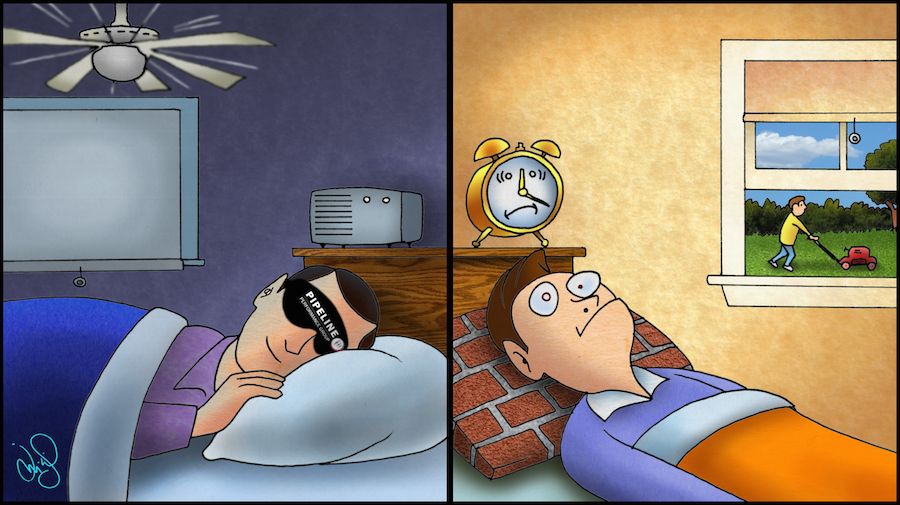
Sleep hygiene refers to a set of practices and habits that are necessary for a good night's sleep and full daytime alertness. The quality of our sleep plays a crucial role in our overall health and well-being. Adequate, restorative rest is essential for our bodies to function optimally, both physically and mentally. In this article, we will dive into the importance of sleep hygiene, understanding the science behind sleep, factors that can affect our sleep patterns, and tips to improve the quality of our sleep.
Understanding Sleep
Sleep is a natural, recurring state of rest characterized by reduced consciousness, slowed metabolism, and relaxed muscles. It consists of different stages, including light sleep, deep sleep, and rapid eye movement (REM) sleep. During deep sleep, our bodies repair tissue, build bone, and strengthen the immune system, while REM sleep is associated with dreaming and cognitive processes.
Factors Affecting Sleep
Various factors can impact our ability to fall asleep and stay asleep. Stress and anxiety can lead to racing thoughts and difficulty relaxing. A poor sleep environment, such as excessive noise, uncomfortable bedding, or a room that is too hot or too cold, can disrupt our sleep. Unhealthy lifestyle habits like irregular sleep schedules, poor diet, lack of exercise, and the use of electronic devices before bed can also interfere with our ability to get a good night's rest.
Benefits of Good Sleep Hygiene
Implementing good sleep hygiene practices can have a profound impact on our overall well-being. Improved cognitive function, better mood regulation, enhanced physical health, and increased productivity are just some of the benefits of getting quality sleep on a regular basis.
Creating a Sleep-Inducing Environment
Creating an ideal sleep environment is essential for achieving restful sleep. This includes optimizing your bedroom for sleep by keeping it dark, quiet, and cool. Investing in a comfortable mattress and pillows that support your sleeping position can also make a significant difference in the quality of your rest.

Also read:- Unlocking the Mystery: Delving into Hypertension, Diabetes, Cancer, and Respiratory Illnesses
Establishing a Bedtime Routine
Establishing a consistent sleep schedule and creating a relaxing bedtime routine can help signal to your body that it is time to wind down and prepare for sleep. This may include activities like reading a book, taking a warm bath, or practicing relaxation techniques like deep breathing or meditation. Avoiding electronic devices, such as smartphones and laptops, before bed can also help promote better sleep.
Healthy Lifestyle Habits for Better Sleep
Regular exercise has been shown to improve sleep quality and increase the amount of time spent in deep sleep. Eating a balanced diet rich in nutrients and avoiding large meals close to bedtime can also contribute to better sleep. Caffeine and alcohol should be consumed in moderation, especially later in the day, as they can disrupt sleep patterns.
Managing Stress and Anxiety
Stress and anxiety can be major contributors to sleep disturbances. Practicing stress-reduction techniques such as yoga, meditation, or mindfulness can help calm the mind and promote relaxation before bedtime. If stress and anxiety are persistent and affecting your sleep, it may be beneficial to seek the help of a mental health professional.
Sleep Hygiene Practices
In addition to creating a sleep-inducing environment and establishing a bedtime routine, there are several other practices that can improve your sleep hygiene. Limiting naps during the day, engaging in relaxing activities before bed, and avoiding stimulants like caffeine and nicotine close to bedtime can all contribute to a better night's sleep.
Conclusion
In conclusion, prioritizing good sleep hygiene is essential for overall health and well-being. By understanding the factors that can affect our sleep, implementing healthy lifestyle habits, and creating a sleep-inducing environment, we can improve the quality of our rest and wake up feeling refreshed and rejuvenated. Remember, a good night's sleep is key to a productive and fulfilling day ahead. Sweet dreams!
FAQs
Q: What is sleep hygiene?
A: Sleep hygiene refers to a set of practices and habits that are necessary for a good night's sleep and full daytime alertness.
Q: Why is good sleep hygiene important?
A: Good sleep hygiene is important for overall health and well-being as it helps improve cognitive function, mood regulation, physical health, and productivity.
Q: What factors can affect our ability to sleep?
A: Factors such as stress, poor sleep environment, unhealthy lifestyle habits, and use of electronic devices before bed can impact our ability to fall asleep and stay asleep.
Q: How can I create an ideal sleep environment?
A: To create an ideal sleep environment, ensure your bedroom is dark, quiet, and cool, invest in comfortable bedding, and avoid electronic devices before bed.
Q: What are some healthy lifestyle habits for better sleep?
A: Healthy lifestyle habits for better sleep include regular exercise, a balanced diet, avoiding stimulants like caffeine and alcohol close to bedtime, and practicing stress-reduction techniques.
Q: How can I manage stress and anxiety to improve my sleep?
A: Managing stress and anxiety through techniques such as yoga, meditation, or mindfulness can help calm the mind and promote relaxation before bedtime. Seeking help from a mental health professional is also beneficial if stress and anxiety persist.


0 Comments